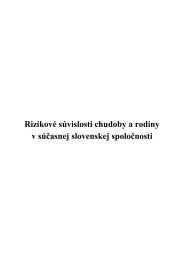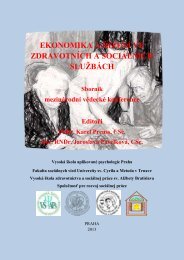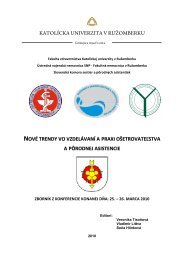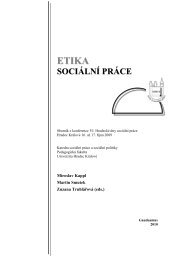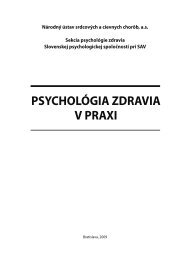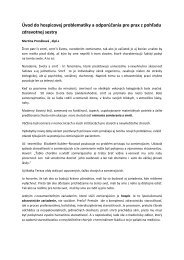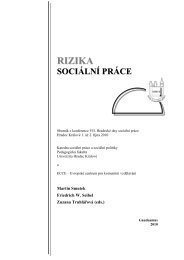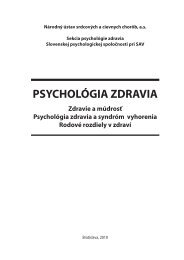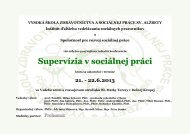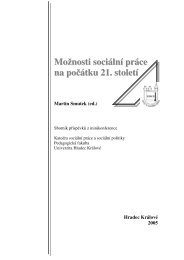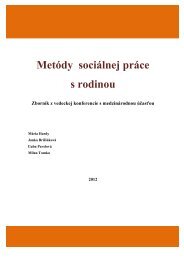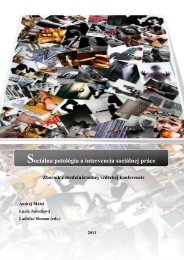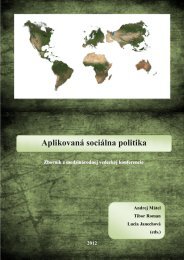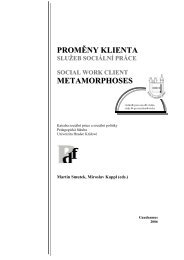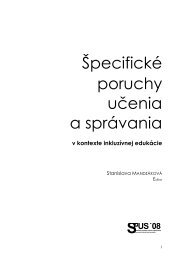Zmena klÃmy â možný dopad (nielen) na obyvateľstvo - Prohuman
Zmena klÃmy â možný dopad (nielen) na obyvateľstvo - Prohuman
Zmena klÃmy â možný dopad (nielen) na obyvateľstvo - Prohuman
Create successful ePaper yourself
Turn your PDF publications into a flip-book with our unique Google optimized e-Paper software.
Discussion<br />
The research conducted provides strong evidence that young children are building<br />
conceptions of global and justice issues through their lives at home, through<br />
the media and in educatio<strong>na</strong>l settings. This global learning, which may be incidental<br />
and unbalanced, highlights the need to introduce global citizenship into<br />
early childhood education. However the research also indicates particular concerns<br />
that can arise when global or justice issues are explored with young children.<br />
The educatio<strong>na</strong>l programme arising from the research identifies suitable content<br />
and pedagogy for early childhood global citizenship education. It suggests that<br />
connecting young children emotio<strong>na</strong>lly, geographically and intellectually with<br />
people and places in developing countries supports a more critical, complex and<br />
engaged approach to global learning.<br />
Exploring Fairness as a Global Citizenship Concept<br />
The results of this research reflect the wider literature which suggests that children’s<br />
thinking around fairness develops considerably from pre-school age (Killen,<br />
Breton Ferguson and Handler, 1994; Killen and Smeta<strong>na</strong>; 1999; Tisak 1995 cited<br />
in Killen et al., 2001). Participant educators, echoing Aistear (NCCA, 2009), identified<br />
the concept of fairness as a integral part of early childhood education and<br />
recognised the parallels between the daily concerns of small children and global<br />
issues, discussed by Fountain (1990).<br />
While the concept of fairness might be acknowledged as an appropriate global<br />
citizenship theme for early childhood education (Fountain, 1990; Ramsey, 2008b,<br />
Oxfam, 2006), the question remains as to how it can be explored to best support<br />
children’s development as global ‘justice-orientated’ citizens (Westheimer and<br />
Kahne, 2004). As the research highlights, exploring ‘fairness’ in a global context<br />
risks reinforcing prevailing social attitudes, where labelling sce<strong>na</strong>rios as fair and<br />
unfair is used to privilege and perpetuate a deficit model of development.<br />
One recommendation arising from the research is that the concept of fairness<br />
be explored as it arises incidentally in the classroom or pre-school. Where educators<br />
encouraged further reflection on fairness as opportunity presented itself in the<br />
course of the day, learning was perceived to be more meaningful than where sce<strong>na</strong>rios<br />
were simulated or contrived. From a global citizenship education perspective,<br />
children’s exploration and articulation around the concept of fairness as it applies to<br />
their immediate context exercises political skills and social activism (Fisher, 2005;<br />
Hicks, 2003; Fountain, 1990; McCloskey, 2011), thereby developing citizenship.<br />
179



